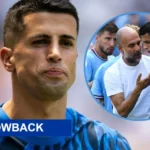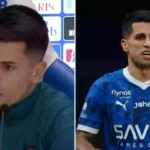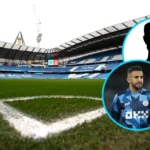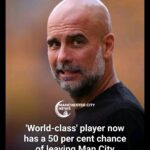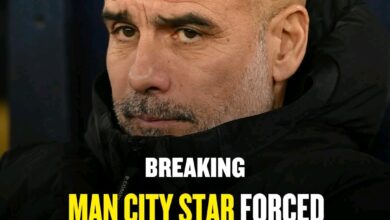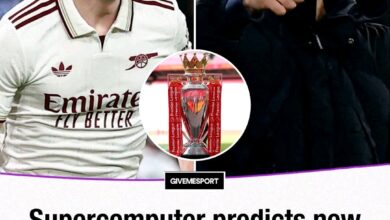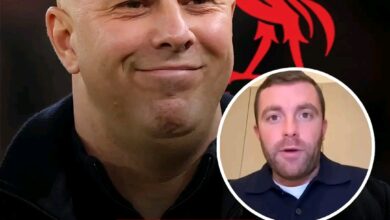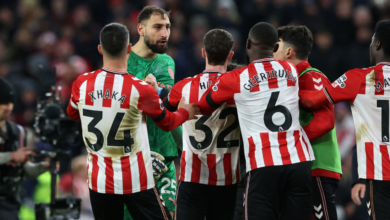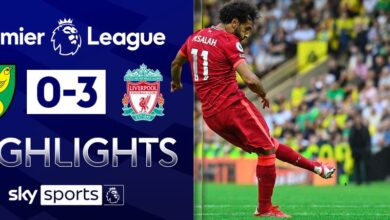I Won 3 PL Titles Under Guardiola – He Then Told Lies & Exiled Me From Man City
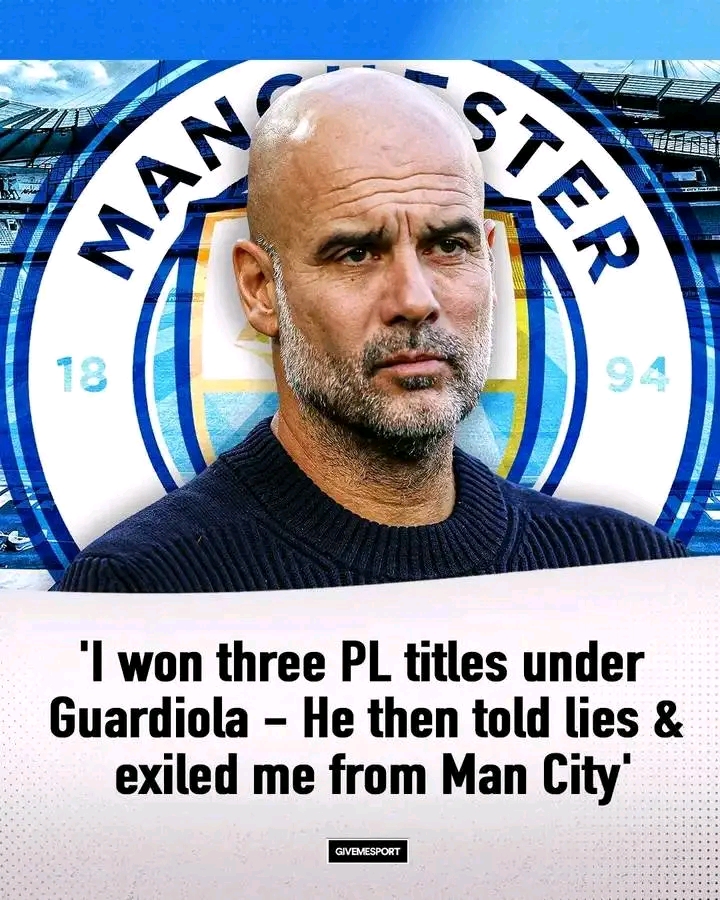
João Cancelo’s journey through the echelons of European football is a tale of brilliance, ambition, and unexpected turns. From his early days at Benfica to his stints with top clubs like Juventus, Manchester City, Bayern Munich, and Barcelona, Cancelo’s career has been marked by both accolades and challenges. His recent move to Al-Hilal in the Saudi Pro League signifies a new chapter, but the path leading there is rich with stories of triumph and tribulation.
Born in Barreiro, Portugal, Cancelo began his football journey with Benfica’s youth system. His talent was evident early on, and he quickly ascended through the ranks, making his professional debut with Benfica B in 2012. His performances caught the attention of Spanish club Valencia, leading to a loan move in 2014, which later became a permanent transfer. At Valencia, Cancelo honed his skills as a dynamic full-back, known for his attacking prowess and versatility. His ability to contribute both defensively and offensively made him a valuable asset. In 2017, he joined Inter Milan on loan, further showcasing his capabilities in Serie A
In 2018, Cancelo signed with Juventus, where he continued to impress with his performances. His tenure with the Bianconeri was marked by a Serie A title win in the 2018-2019 season. However, after just one season, he made a high-profile move to Manchester City in 2019, as part of a deal that saw Danilo move in the opposite direction.
Under Pep Guardiola, Cancelo’s role evolved. He became an integral part of City’s tactical setup, often playing as an inverted full-back, contributing to both defense and midfield play. His technical skills, vision, and adaptability were crucial in City’s domestic successes, including multiple Premier League titles.
Despite his contributions, Cancelo’s time at Manchester City was not without challenges. In the 2022-2023 season, his playing time diminished, leading to speculation about his relationship with Guardiola. In January 2023, he was loaned to Bayern Munich, where he continued to perform at a high level. However, Bayern chose not to exercise the option to make the move permanent.
Following his stint in Germany, Cancelo joined Barcelona on loan for the 2023-2024 season. Financial constraints and strategic decisions prevented a permanent transfer, despite his desire to continue with the Catalan club.
In August 2024, Cancelo made a permanent move to Al-Hilal in the Saudi Pro League. The transfer marked the end of his European club career, as he joined a growing list of players moving to the Middle East. At Al-Hilal, he reunited with former European stars, aiming to bring his experience and skill to the burgeoning league.
João Cancelo’s career trajectory reflects the complexities of modern football, where talent, tactical fit, and club dynamics intertwine. His journey from Portugal to Saudi Arabia encompasses a wealth of experiences, achievements, and lessons. As he embarks on this new chapter, his legacy as a versatile and accomplished footballer remains firmly
While João Cancelo’s footballing journey sparkles with medals, moments, and magic, it is the dramatic chapter with Manchester City and Pep Guardiola that continues to stir conversations around the footballing world. What appeared on the surface to be a standard career transition was, in fact, the climax of a bitter fallout between one of football’s most expressive full-backs and one of its most controlling managers.
Cancelo was more than just another signing at Manchester City—he was a tactical masterpiece brought to life by Guardiola’s philosophy. When he joined the club in 2019 from Juventus in a £60 million move, he wasn’t just arriving with promise, he came with purpose. Guardiola knew what he wanted: a defender who could also be a playmaker, someone who could invert into midfield, dictate tempo, and double as a winger when needed. Cancelo became that player. And for three and a half seasons, he didn’t just deliver—he dazzled.
But by late 2022, something changed. Despite being a starter and one of the most consistent names on the team sheet, Cancelo suddenly found himself warming the bench. The young Rico Lewis, raw but promising, started getting minutes. Nathan Aké, a natural center-back, was shifted to left-back. Slowly, Cancelo was being edged out. And the silence from Guardiola was deafening.
Publicly, Pep remained diplomatic. When asked why Cancelo wasn’t playing as often, he claimed it was “a tactical choice,” that the squad had options and that rotation was key. But soon, more pointed statements emerged. Guardiola suggested that Cancelo’s attitude was not conducive to team harmony. “The players that play are those who deserve it in training,” he remarked cryptically.
To the fans and media, it looked like Cancelo was the problem. But now, in his own words, the Portuguese international has chosen to fight back against that narrative. “Lies were told,” Cancelo declared in an emotional interview with A Bola. “I was never a bad teammate. You can ask Rico, you can ask Aké. I never caused division in the dressing room. I gave my all, every single time I wore the shirt.”
This was no longer just a story about tactics—it was a battle for truth. Cancelo revealed that his exit was painted in a way that made him look like the villain. And it hurt. This was a player who had helped the club win three Premier League titles, was part of their record-breaking treble season, and was named in the PFA Team of the Year. Yet when he left on loan to Bayern Munich in January 2023, the send-off was cold, clinical, and unceremonious.
Cancelo pointed to moments that showed his commitment to Manchester City. One in particular stands out: a Premier League match against Arsenal at the Emirates, played just 24 hours after his home was violently robbed. His wife and daughter were at home when the break-in occurred. They were left terrified, shaken to their core. Cancelo had bruises on his face from trying to protect them. He could have asked to sit out the match. No one would have blamed him. But he didn’t. “I played that day with my heart heavy and my body sore. Not for the money, not for appearances, but for the badge,” Cancelo said. “These are things people forget. But I don’t.”
Moments like these are what, in his eyes, made the treatment he received from Guardiola even more painful. He wasn’t a fringe player demanding more game time—he was a leader, a warrior, someone who left everything on the pitch. And yet, when the spotlight shifted away from him, so did the support. One of the most powerful lines Cancelo delivered in his interview was: “People will always believe him [Guardiola], because he has more power than I do. But I sleep well because I tell the truth. I am transparent. I never lie.”
This cuts deep into the heart of modern football. Managers like Guardiola, with their accolades, charisma, and massive media presence, often control the story. When they speak, it becomes gospel. When players leave, especially under strange or quiet circumstances, people assume the worst about the player. Few stop to consider that sometimes, the story isn’t so black and white.
Cancelo’s case isn’t the first. Guardiola has had his fair share of high-profile fallouts. At Barcelona, it was Zlatan Ibrahimović. At Bayern Munich, it was Mario Götze. At City, there were subtle tensions with Leroy Sané and Raheem Sterling before their exits. All talented players, all with strong personalities. And in many cases, the parting came not because of poor performance—but because of personality clashes.
What perhaps hurt Cancelo most was not just Guardiola’s version of events—it was Manchester City’s silence. There was no official defense of his character. No thank-you message that matched his contributions. No open farewell to a player who had, for years, been one of their best.
He still loves the club. That much is clear. In his own words, he said, “I think Man City were a bit ungrateful to me… I never failed in my commitment to the club, to the fans, and I always gave everything.” This was not about money. Not about jealousy. This was about respect. Recognition. Something that was taken from him, silently and systematically
Before he ever wore the sky blue of City, Cancelo was close to donning the red of Manchester United. In 2019, Ole Gunnar Solskjaer wanted him at Old Trafford. Reports said United were preparing a £42 million bid. They saw Cancelo as the perfect modern full-back—quick, aggressive, technically gifted. But United chose to go for Aaron Wan-Bissaka instead—a player focused more on defense than flair. In hindsight, it’s a decision that has sparked debate among fans. Would Cancelo have thrived under Solskjaer? Would his personality have fit better? Would he have found more respect?
We’ll never know. But what we do know is that, despite the trophies he won with City, Cancelo leaves England with a bitter taste. His time was decorated with success—but stained by misunderstanding. In 2024, Cancelo’s move to Al-Hilal in Saudi Arabia marked the end of his European adventure. Some saw it as a step down. Others saw it as a fresh start.
At Al-Hilal, he’s surrounded by top talent—players like Neymar, Ruben Neves, Kalidou Koulibaly—all players who have made the same leap. And while some criticize the league for its money-driven signings, Cancelo’s reasons seem deeper. It’s a place where he can be free from the whispers. From the media. From Guardiola’s shadow. A place where his past doesn’t define him.
For all the drama, Cancelo remains one of the most influential full-backs of his generation. He revolutionized the position. At his peak, he was arguably the best in the world at what he did—defend, create, control. His touch, his awareness, his vision—few could match it.
His time at Manchester City may have ended in shadows, but the light he brought to the pitch can’t be erased. He played with Kevin De Bruyne, with Bernardo Silva, with Erling Haaland. He helped make history. And no manager’s version of events can take that away from him.
What matters most, in Cancelo’s words, is that he sleeps well. That he speaks the truth. That when his daughter grows up, she’ll know her father stood for honesty, not politics. He might never return to Manchester City. He might never reconcile with Pep Guardiola. But he walks away with his head high and his story finally told
